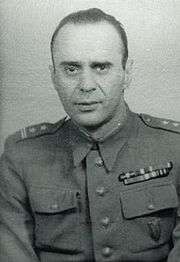Józef Różański
Józef Różański (Polish pronunciation: [ˈjuzɛf ruˈʐaɲskʲi]; born Josef Goldberg;[1] 13 July 1907, in Warsaw – 21 August 1981, in Warsaw) was an officer in the Soviet NKVD Secret Police and later, a Colonel in the Polish Ministry of Public Security (UB), a communist secret police. Born into a Polish-Jewish family in Warsaw, Różański became very active in the Communist Party of Poland before World War II.[1] He joined the NKVD following the Soviet invasion of Poland[2] and after the war, adopting the name Różański, served as an agent with the Polish Communist Security apparatus (Urząd Bezpieczeństwa).[3]
Józef Różański | |
|---|---|
 | |
| Born | July 13, 1907 |
| Died | August 21, 1981 (aged 74) Warsaw, Polish People's Republic |
| Other names | Josef Goldberg, also as "Jacek Różański" |
| Citizenship | Polish |
| Occupation | Interrogator |
| Known for | State Security Services (Służba Bezpieczeństwa) |
Różański was personally involved in torturing and killing dozens of opponents of the Polish People's Republic (PRL), including anti-communists.[4] and "Cursed soldiers". He gained notoriety as one of the most brutal secret police Officers in Warsaw.[5][6] Różański personally administered torture to Witold Pilecki, one of the most famous "Cursed soldiers" and the only individual who willingly went to Auschwitz Camp. Pilecki revealed no sensitive information and was executed on May 25, 1948 at Mokotów Prison by Sergeant Smietanski, the "Butcher".[7][8]
Józef Różański was arrested in 1953 – at the end of the Stalinist period in Poland – and charged with torturing innocent prisoners, including Polish United Workers' Party members. He was sentenced to 5 years in prison on 23 December 1955.[4] In July 1956, the Supreme Court reopened his case due to improprieties discovered in the original investigation. On 11 November 1957 (charged along with co-defendant Anatol Fejgin), he was again sentenced by the lower court this time to 15 years in prison.[4] He was released in 1964, having served seven years. Różański died of cancer on 21 August 1981, and was buried at the Jewish Cemetery in Warsaw.[4]
Różański was a brother of Jerzy Borejsza.[9]
Notes and references
- Wróbel, Piotr (2014). Historical Dictionary of Poland 1945-1996. Routledge. p. 269. ISBN 1135926948.
- Terlecki, Ryszard (2007). Miecz i Tarcza Komunizmu. Historia aparatu bezpieczestwa w Polse 1944-1990 (The Sword and Shield of Communism. History of security organs in Pland 1944-1990) (in Polish). Krakow: Wydawnictwo Literackie. pp. 54–5. ISBN 9788308041055.
- Nalewajko-Kulikow, Joanna (2015). Dynner, Glenn; Guesnet, Francois (eds.). "Di Haynt-mishpokhe": Study for a Group Picture. Warsaw. The Jewish Metropolis: Essays in Honor of the 75th Birthday of Professor Antony Polonsky. BRILL. p. 261. ISBN 9004291814.
- Barbara Fijałkowska, RÓŻAŃSKI "LIBERAŁEM", 15 December 2002, Fundacja Orientacja "abcnet"; see also: B. Fijałkowska, Borejsza i Różański. Przyczynek do dziejów stalinizmu w Polsce, ISBN 83-85513-49-3
- Piekarski, Konstanty R. (1990), Escaping Hell: The Story of a Polish Underground Officer in Auschwitz and Buchenwald, Dundurn Press Ltd., ISBN 1-55002-071-4, p. 249
- Lidia Świerczek, Pilecki`s life Institute of National Remembrance. Last accessed on 14 March 2009.
- Barbara Fijałkowska, Borejsza i Różański. Przyczynek do dziejów stalinizmu w Polsce, Olsztyn 1995. ISBN 83-85513-49-3, pp. 260, 203, 210, 216-223.
- AIPN, 0193/7094, Akta osobowe Józefa Różańskiego, k. 5.
- Zdzisław Uniszewski. Józef Różański. "Karta". 31 (2000).
- Stanisław Marat, Józef Snopkiewicz: Ludzie bezpieki: Dokumentacja czasu bezprawia. Warszawa: Alfa, 1990. ISBN 978-83-7001-361-5.
- (in Polish) "Curriculum vitae" written by Józef Różański himself on 7 September 1944, for the Ministry of Public Security of Poland
- Aldona Zaorska, Sąsiedzi. Najbardziej okrutni oprawcy polskich patriotów, Warszawa 2012, ISBN 978-83-932704-4-6.